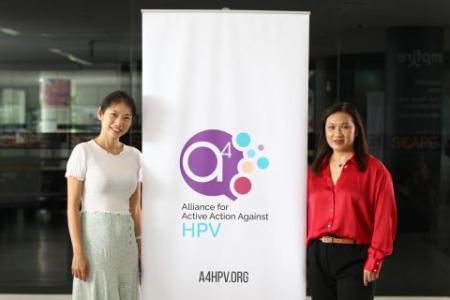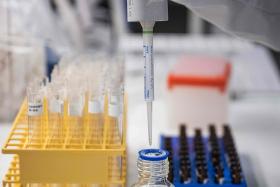Group aims to raise awareness of HPV, wants men to get vaccine too
While the human papillomavirus (HPV) which can cause cancers can be prevented by vaccination, in Singapore, only women get this protection on a regular basis.
One local group, the Alliance for Active Action Against HPV, is hoping to change this.
Launched in March, the group hopes to organise more workshops for men, with the easing of Covid-19 restrictions.
The aim is to raise awareness of HPV and the diseases it can cause.
"When you want to share this kind of thing, you have to talk face to face," said Mr Tan Han Sen, a volunteer with the group.
He added that it is easier for men to broach the topic with their peers. "If you ask a woman to talk to a man, the man might say 'I don't have this kind of problem.'"
Professor Roy Chan, who is president for Action for Aids and a specialist in sexually transmitted infections, said men need to be vaccinated as well.
"We cannot protect men by protecting only women," he said. "Men must also get that protection."
There are more than 100 strains of HPV, and they are often transmitted through sexual contact.
While the virus is most commonly linked to cervical cancer in women, it can also cause rare cancers such as anal and oropharyngeal cancer - a form of head and neck cancer.
Men with HPV also have a higher risk of developing cancer of the penis, which is a rare malignancy.
The number of patients with such rare cancers is small, and data is sparse.
One local study conducted this year estimated the number of oropharyngeal cancer cases at less than one per 100,000 people in Singapore annually.
But doctors suspect that case numbers are rising along with changed attitudes towards casual sex, with the fear that these figures could reach "epidemic status" in the future.
This is because the virus takes time to manifest as disease, meaning that today's cancer numbers represent a snapshot of behaviour up to 40 years ago.
"It is a disease that manifests many years after exposure," said Dr Lim Ming Yann, who is deputy head of Tan Tock Seng Hospital's otorhinolaryngology department.
"So it is important that as sexual practices and attitudes evolve, we monitor the situation closely so as not to be caught off guard by an epidemic 20 to 30 years later."
The impact of vaccination is clear with a new study published in the Lancet showing lower cervical cancer rates among women across all age groups.
For example, girls who were offered HPV vaccination when they were 12 or 13 showed an 87 per cent lower rate of cervical cancer, while those who received the vaccine between the ages of 16 and 18 showed a 34 per cent lower rate.
The World Health Organisation aims to vaccinate 90 per cent of all girls by the age of 15, and eliminate cervical cancer by 2030.
The vaccine is most effective when given before a person becomes sexually active, and thus risks contracting HPV.
In Singapore, women and girls aged between nine and 26 can use MediSave to cover the cost of their HPV vaccinations.
Two or three doses are typically needed, depending on when the first shot was administered.
Since 2019, all Secondary 1 girls have also been able to choose to take the vaccine for free.
But men do not have this option. This is because the incidence rate of HPV-related cancers in men is relatively low, noted Dr Lim.
Prof Chan suggested that it is time for things to change, and that the vaccine should be made equally accessible to both genders.
This is already done in some countries, including Australia.
"There shouldn't be a gender differentiation," he said.
Dr Lim added: "In the meantime, it is important to refrain from high-risk sexual behaviours and stay faithful to one sexual partner only. This would be the best advice I have for anyone."
Get The New Paper on your phone with the free TNP app. Download from the Apple App Store or Google Play Store now


